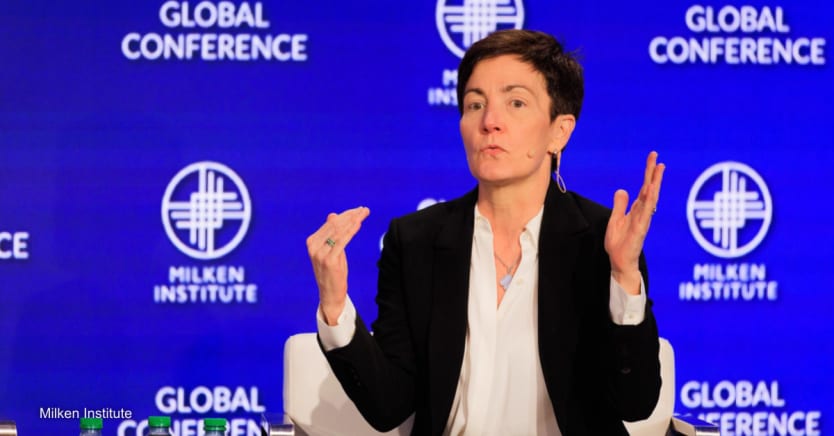
The International Finance Corporation will launch two new financing facilities to keep money flowing into Ukraine and its neighboring countries, and to address the growing food crisis triggered by the Russian invasion.
Sign up for Devex Invested
The must-read weekly newsletter that keeps you up to date with news about business, finance, and the SDGs.
A new fast-track facility will support projects in Ukraine and surrounding countries, Stephanie von Friedeburg, IFC’s senior vice president of operations, told Devex. Among initiatives it could support are helping Uzbekistan redirect supply chains away from Russia and financing affordable housing for refugees and new energy supplies such as wind power in Poland, she said.
The second facility is a global food security platform — similar to IFC’s global health platform — which will support commodity traders, farmers, food processors, and fertilizer-related businesses.
“In development circles, people are quite aware that this is going to be bigger than the last [food] crisis,” von Friedeburg said. But with the largely finance crowd at the Milken Institute Global Conference in Los Angeles last week, there was a “lack of connective tissue” or recognition that the crisis could result in millions of people starving, von Friedeburg said in an interview on the sidelines of the event.
IFC’s response to the dual challenges is modeled off of its COVID-19 response, which included a fast-track facility to provide liquidity and a global health platform to accelerate health-related investments, she said.
The new facilities have not been launched, so final spending limits are not yet available but von Friedeburg said they will respond to concerns that IFC is hearing.
Commodity traders have told IFC that their credit lines are drying up and they are asking for help, she said.
Many farmers are already “on the edge, and their yields will fall even lower,” von Friedeburg said, so IFC is considering potential investments in green fertilizers or different technologies that require less fertilizer. It will also look at how gas flaring can be used for fertilizer in countries such as Nigeria and Argentina, she said.
While the fast-track facility is aimed at Ukraine’s neighbors, it will also provide support to Ukraine. But how and when it invests depends on whether donors provide funding to de-risk investments, she said. In Ukraine, IFC will focus on agribusiness, food processing, green and affordable housing, and eventually rebuilding infrastructure.
IFC currently has about $380 million of committed investments in Ukraine, which support the country’s financial markets, agriculture, green municipal infrastructure, and port infrastructure since the pandemic began.
Since the start of the war on Feb. 24, IFC has continuously reassessed its investments in Ukraine and been in touch with borrowers regularly, von Friedeburg said. IFC was a “big lender” to the besieged city of Mariupol before the war, helping buy new buses — a roughly $14 million investment — and “it’s difficult to imagine us being able to ever recuperate that,” von Friedeburg said.
“In development circles, people are quite aware that this is going to be bigger than the last [food] crisis.”
— Stephanie von Friedeburg, senior vice president of operations, International Finance CorporationShe’s most concerned about assets in eastern Ukraine, where it will be difficult to recoup investments if they end up in Russian territory, and IFC has set aside reserves against expected potential losses.
She’s also been surprised that borrowers in the country have continued to make full payments.
“I was expecting the need for more forbearance and it may come in time, but they're certainly trying to keep things operating,” she said, adding that for borrowers unable to pay, the IFC has suspended payments until it’s determined if the borrowing company can be rebuilt.
IFC is working with the World Bank’s Multilateral Investment Guarantee Agency to open additional trade lines to the state-owned banks to “keep critical commodities coming in,” she said. IFC has also dispersed funding to two new investments since the start of the war: a chain of gas stations and food marts mainly in western Ukraine, which needed working capital to redirect supply chains, and a pork company that needed capital to sow their fields to provide food for the pigs.
One key request that the Ukrainian government had for IFC in a recent meeting was for support to dredge the Danube River so they can transport grain down the river, von Friedeburg said. Ukraine has started to use the river as a trade route following the closure of the now Russian-controlled Black Sea ports but it is not deep enough for large barges. Ukraine is struggling to export its wheat, which is sitting in silos. If it can’t be transported, there will be nowhere to store next year's crop, further exacerbating global food insecurity, she said.

